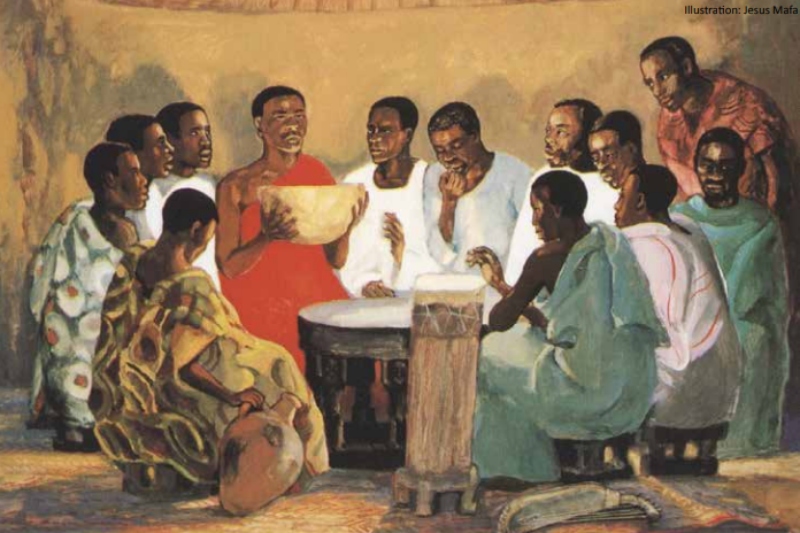Discerning the prophetic: perspectives of Majority World theologies on suffering and discipleship
If the church is going to do discipleship and mission well in this Corona-climate, we need to grasp Jesus’ understanding of suffering and sacrifice – and listening to Majority World voices is essential, writes Israel Olofinjana

How do we discern the prophetic at this critical time in human history? Covid-19 has uncovered and continues to expose the social inequality issues that have plagued our world. For instance, while the virus affects everyone irrespective of colour, class, age or gender, it has become very clear that it has a worse impact on poorer people and people of colour.
If the Western Church, in all its diverse expressions, is going to be an agent of social change, speaking truth to power, then it has to do something it is not very good at: listen to Majority World voices on the issues of discipleship and suffering. The church cannot minister effectively post-COVID-19 if it does not understand suffering and loss. While everyone suffers, the suffering that has shaped Majority World Christians, and therefore their theologies, is one the Western Church will have to pay attention to for its future relevance. A good place to start is to understand the Jesus model of discipleship rooted in suffering and sacrifice.
Any meaningful discussion on discipleship must start with the understanding of the lordship of Christ. It is within this context we can talk about following Jesus in obedience, dedicating our lives to God’s kingdom. The lordship of Jesus as the messiah who came to inaugurate God’s kingdom on earth is the central theme of the New Testament. Jesus’ idea of the kingdom of God was a radical message in that a worldly king and kingdom in his day was displayed through pomp and pageantry, but the kingdom Jesus introduced was defined by love, submission, humility and peace. Therefore Jesus taught that those who want to be great or lead must become a servant-leader ready to serve (see Mark 10:34-45).
The crucial question I have been wrestling with is if Jesus’ way of life includes suffering and sacrifice, how can our whole-life discipleship revolve around these concepts? Often times we want to be followers of Jesus, but only when it is convenient or when we are benefitting from the relationship. However, Jesus’ imperative calling to his disciples was if anyone will follow me, they must deny themselves and carry the cross (Matthew 16:24; Mark 8:34; Luke 9:23). Denying ourselves in a consumeristic, materialistic and individualistic society involves a lot of suffering, and carrying the cross means we are ready to sacrifice to the point of death for the sake of God’s kingdom. Jesus himself demonstrated this as a suffering-servant who paid the ultimate price on the cross.
The implication of this is that our discipleship programmes and events, if not preparing people to understand the idea of suffering and sacrifice, will mean they will only follow Jesus temporarily when all is going well. The result is that people will follow Jesus for a while and when things get really tough, will walk out on God. Another implication is that we follow Jesus as the only lifestyle and not as an optional lifestyle when it is convenient and comfortable. It is putting every part of us, mind, will and emotions and all aspects of our lives, job, family, education, hobbies, and finances before God to use as he pleases and whenever he calls us.
After Jesus gave some serious teaching about what it means to believe and follow him, many of the Jews left him. Then he asked the disciples one important question: “Do you also wish to go away?” (John 6: 67 NRSV).
Peter’s answer is very important for our discipleship today because it demonstrates loyalty and obedience to the lordship of Christ. “Lord, to whom can we go? You have the words of eternal life.” (John 6:68 NRSV). Peter’s answer is conditioned on the understanding that following Jesus even when it is rough and difficult is not an optional lifestyle, his very own survival depends on it. This changes the narrative completely.
Jesus’ notion of suffering and sacrifice as an essential element in following him has been demonstrated through the history of the church. Eusebius, the church historian, chronicles the sufferings and martyrdom of the early disciples and of how the church expanded through persecution in its first 300 years. (1) Many of the early disciples of Jesus suffered in different ways and ultimately sacrificed their lives in following God’s call to incarnate his kingdom. Martyrdom, that is, the idea of dying for the course of Christ, was a major theme in early and Patristic Christianity. It also became a vehicle for advancing God’s kingdom so that Tertullian (c. AD 150- 225), an African church father and theologian could say, “the blood of the martyrs is the seed of the Church’ (Tertullian, Apology, book 50). (2) In essence, martyrdom and mission went hand in hand.
The characteristics of the context COVID-19 presents are uncertainty, despair, suffering, pain, grief, trauma, loss and isolation. It is, perhaps, the followers of Jesus who have been prepared through suffering and sacrifice that are best placed at this time to reach out to people and help them follow Jesus faithfully. The idea of suffering and sacrifice is relative, so that which Majority World Christians who are refugees, asylum seekers and economic migrants have suffered (and continue to suffer) will be very different from white middle class European Christians. This is not to say that white people do not suffer, that is far from the case I am trying to make here: white people do suffer indeed in various ways and forms. I am also not advocating or suggesting that Africans, Asians or Latin Americans have a monopoly on pain and trauma. An example of a white European who suffered will be the experience of the German theologian, Jurgen Moltmann who spent his early years in a prisoner-of-war camp, an experience from which he developed a pioneering approach to the notion of a suffering God. (3) Moltmann’s theology of suffering of a God that suffers through Jesus in a suffering world is a very powerful reflection needed for this period.
But what I am nuancing is the fact that some Majority World (Africa, Asia and Latin America and the Caribbean) history demonstrates that certain regions of the world have suffered from systemic and institutional injustices like the slave-trade, indentured servitude, imperialism, colonialism, neo-colonialism, and this therefore makes Majority World Christians accustomed to suffering and pain. A recent example of what African descendants suffer is the police brutality and eventual murder of George Floyd which has now led to several mass protests in around the world.
Some of the Majority World theologies originate in the context of loss and pain. An example is Liberation Theology which developed in the socio-economic poverty context of Latin America as the Catholic church responded to side with the poor and the marginalised.(4) In the African context, Black Theology emerged in Southern Africa to challenge the systemic injustice caused by the Apartheid regime. African Political Theology that developed elsewhere on the continent also has something to offer in terms of the theology of lament: a prime example is the work of the Roman Catholic Ugandan theologian Emmanuel Katongole who in his book speaks of the evil and trauma of the recent conflict in Congo and the need to know how to lament. (5)
If there is one thing common to these theologies it is that they take the suffering of the poor and the oppressed as their hermeneutical lens, and therefore their understanding of discipleship is rooted in Jesus’s humility and sacrifice and how that shaped his ministry praxis. The implication is that these theologies emphasise that following Jesus entails suffering and loss, and that mission is responding in solidarity with the poor and the oppressed. Majority World Christians who have relocated to Europe or North America through various migratory factors come with this notion and experience of discipleship. Diaspora Christians therefore understand from first-hand experience that whole-life discipleship entails different kinds of suffering and demands sacrifice. If the church is going to do discipleship and mission well in this Corona-climate, we need to grasp Jesus’ understanding of suffering and sacrifice.
 The Revd Israel Olofinjana is the minister of Woolwich Central Baptist Church and Director of the Centre For Missionaries from the Majority World cmmw.org.uk, and the author of several books
The Revd Israel Olofinjana is the minister of Woolwich Central Baptist Church and Director of the Centre For Missionaries from the Majority World cmmw.org.uk, and the author of several books
World Christianity in Western Europe is a new book edited by Israel and published by Regnum Books, Studies in Mission (Oxford Centre for Mission Studies)
This article appears in the autumn edition of Baptists Together magazine
Click here to listen to Israel talk about this article
1 Eusebius, The History of the Church, Middlesex, England, Penguin Books, 1965.
2 John Foxe and M Hobart Seymour, The Acts and Monuments of the Church: Containing the History and Sufferings of the Martyrs, Part 1 (London, Charter House, 1838), p.44.
3 Jurgen Moltmann, The Crucified God (London, SCM Press, 1974).
4 See as an example, Gustavo Gutierrez, A Theology of Liberation (London, SCM Press, 1974
5 Emmanuel Katongole, Born from lament: The Theology and Politics of Hope in Africa (Grand Rapids, MI, Wm. B. Eerdmans Publishing, 2017). See also Cathy Ross, Lament and Hope https://churchmissionsociety.org/resources/lament-and-hope-cathy-ross-anvil-vol-34-issue-1/ (Accessed 6th May 2020)